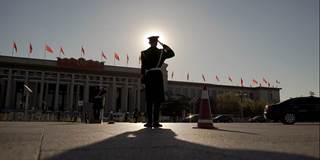For China, America's rejection of the rules-based multilateral order and embrace of bilateral deal-making creates significant uncertainty. But Chinese policymakers have the tools to overcome the challenge ahead, beginning with the systemic mindset that has shaped decision-making in the country for millennia.
HONG KONG – The historian Wang Gungwu recently observed that, whereas the West thinks in terms of ideologies, China has long thought in terms of systems. In today’s age of rapid and profound change – characterized, in particular, by a fundamental shift in America’s attitude toward the rest of the world – China’s system reform approach is being put to the test.
Under President Donald Trump, the United States seems to have abandoned its seven-decade-old commitment to the rules-based multilateral order, embracing bilateral deal-making instead, guided by an “America First” agenda. This includes a willingness to make just about any excuse for unilateral action, such as large trade tariffs, against other countries, in order to please domestic constituencies.
This approach adds a new layer of uncertainty to any negotiation, not least because the Trump administration’s decision to change the global rules of the game is not particularly promising for the US itself. After all, US-owned companies, which have long extracted the most value from global supply chains, will be the biggest casualties of a trade conflict.

HONG KONG – The historian Wang Gungwu recently observed that, whereas the West thinks in terms of ideologies, China has long thought in terms of systems. In today’s age of rapid and profound change – characterized, in particular, by a fundamental shift in America’s attitude toward the rest of the world – China’s system reform approach is being put to the test.
Under President Donald Trump, the United States seems to have abandoned its seven-decade-old commitment to the rules-based multilateral order, embracing bilateral deal-making instead, guided by an “America First” agenda. This includes a willingness to make just about any excuse for unilateral action, such as large trade tariffs, against other countries, in order to please domestic constituencies.
This approach adds a new layer of uncertainty to any negotiation, not least because the Trump administration’s decision to change the global rules of the game is not particularly promising for the US itself. After all, US-owned companies, which have long extracted the most value from global supply chains, will be the biggest casualties of a trade conflict.